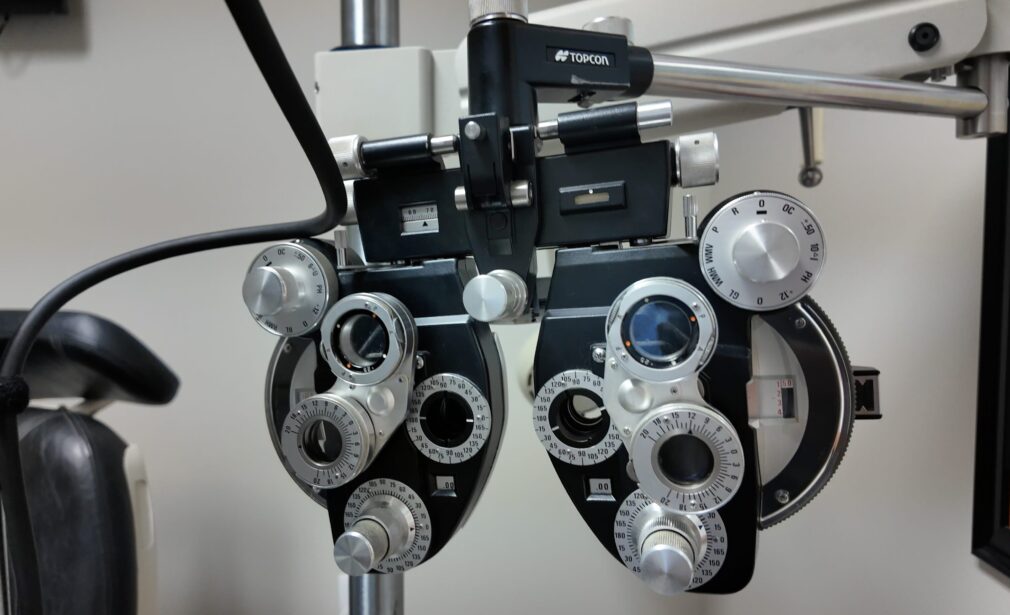Comprehensive Eye Care
Many eye diseases and problems have no early symptoms or warning signs. As a result, they often go undetected until a condition worsens substantially. An estimated one out of every 19 Americans suffers poor vision. The medical experience and technology used at Southern Kentucky Eye Center enables earlier detection of vision problems such as nearsightedness, astigmatism, or glaucoma by Dr. Mark Henry. Routine eye examinations by eye doctors are the best safeguard against for maintaining good vision.
The American Academy of Ophthalmology recommends the following guidelines for scheduling eye exams over the course of a lifetime:
- Children should have their first eye exams by age 5. Earlier examinations are recommended if there are problems such as crossed eyes or a family history of a lazy eye. Following this initial appointment, children with normal vision should be screened every two years.
- People between the ages of 20 and 39 only need eye examinations if a noticeable change in vision occurs or if they wear corrective lenses. People in this age group who wear corrective lenses should schedule an exam every year, as should those at risk for glaucoma or who know they have eye disease.
- Beginning at age 40, regular eye exams should be scheduled every year. If a change in vision is noticed, an exam should be scheduled immediately.
- At age 65, yearly exams become necessary to rule out glaucoma, cataracts or other age-related eye diseases.
Over-40 Vision
A natural condition of aging is a visual change known as presbyopia or over-40 vision. It is a gradual loss of the ability to focus on near objects and is sometimes referred to as “old age vision”. When we are young, the natural lens of the eye is soft and flexible, and the eye muscles are able to stretch or retract the lens easily. As we age, this lens flexibility is reduced, and it become more difficult for us to focus on nearby objects. This often leads to the necessity of reading glasses or bifocals.
A clear lens exchange, or refractive lensectomy, with one of our LifeStyle Lenses restores this flexibility. This replacement lens flexes easily, restoring much of our ability to quickly adjust focus between objects near and far. Most of our Over-40 LifeStyle Lens patients are able to eliminate or dramatically reduce their dependence on readers and bifocals.
Another benefit of having a LifeStyle Lens procedure to correct presbyopia is that any possibility of developing a cataract is completely removed. When your inflexible natural lens is replaced with high end flexible LifeStyle Lens, you will never face the diminished, cloudy vision of cataracts. Nor will you ever need cataract surgery.
Our LifeStyle Lens Procedure allows you the freedom to return to the activities you love with renewed vision.
See our LifeStyle Lens section for more details on the lenses offered.
Lazy Eye / Cross Eye
Esotropia | Cross Eyes
Are you suffering from esotropia? You’re not alone. Many people struggle with this eye condition causing the eyes to point toward each other, resulting in a “cross-eyed” appearance. If you’re tired of dealing with esotropia, Southern Kentucky Eye Center may be able to help. As an ophthalmologist in Somerset, Dr. Henry and Southern Kentucky Eye Center offer esotropia treatment designed to alleviate your embarrassment and your discomfort.
Exotropia | Lazy Eyes
Exotropia, commonly referred to as Lazy Eye, is a muscular condition that causes the eyes to point away from each other. Exotropia can impact your vision, comfort, and self-esteem. If you’re tired of dealing with the effects of exotropia, Southern Kentucky Eye Center may be able to help. We offer treatment options designed to improve your condition and associated quality of life.
Your Eye Care Needs Addressed
As a dedicated ophthalmologist in Somerset, Southern Kentucky Eye Center works tirelessly to offer superior care to patients like you. When you come in to discuss exotropia or any other eye-related problem, Dr. Henry will take the time to answer your questions and discuss your available options for treatment. Don’t struggle with esotropia or exotropia when help may be available. For more information about treatment or to set up a consultation with Southern Kentucky Eye Center, call today.
Dry Eye
If you suffer from itchy or painful eyes, light sensitivity or blurry vision, you might have dry eye or dry eye syndrome. Your eyes need a constant flow of tears to maintain moisture and proper function. When the flow of tears is disrupted, the symptoms that result can be annoying and uncomfortable, sometimes making it difficult to see. For many patients, dry eye syndrome is a chronic condition, but fortunately, there are effective ways to treat and manage it. If you’re battling the uncomfortable symptoms of dry eye syndrome, call Southern Kentucky Eye Center in Somerset to learn more about treatment options.
Don’t ignore your discomfort! Dr. Mark Henry at Southern Kentucky Eye Center can evaluate your symptoms and determine whether dry eye syndrome is to blame. If so, we’ll explain your treatment options and provide you with the information you need to effectively manage your symptoms.



